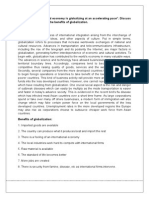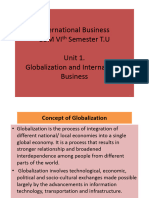International Business
International Business
Uploaded by
DrRahul ChopraCopyright:
Available Formats
International Business
International Business
Uploaded by
DrRahul ChopraCopyright
Available Formats
Share this document
Did you find this document useful?
Is this content inappropriate?
Copyright:
Available Formats
International Business
International Business
Uploaded by
DrRahul ChopraCopyright:
Available Formats
INTERNATIONAL BUSINESS
International business can be described as the business carried on across the national borders between two or more nations. The concept of international business stems from the business processes intersected by the national borders. Since the international business processes are not confined to the geopolitical boundaries in the conventional sense, the term `national border' is to be used in a wider perspective. A more flexible concept of the national border is the contact line between people and the multinational enterprises (MNEs) possessing a distinctive character attributable to their different social, cultural and economic environments. A three-pronged approach may be adopted for understanding the concepts relating to international business. The first prong deals with the transmission of resources from one country to another in the form of shipment of goods, transfer of funds, and movement of people. The second prong is concerned with the relationship of the MNE with the host societies. The third prong involves the elements of conflict arising from the national sentiments and nationalistic attitudes guiding both the parent and the host countries.
The importance of International Business Management in Indian scenario is very high. It is one of the fast developing countries in the world, every developed country like to do business with it, because of its liberalized, globalised and free economy policies. Therefore, many MNCs and Joint Ventures are venturing into the country and even the indigenous companies are going ahead for globalizing themselves. So the need of the hour is a skilled person in international trade, where the company will not be in a position to recruit unskilled one and give them training by spending huge amount after losing precious time.
Concept: Terms describe all commercial transactions (private governmental, sales investments, logistics& transportation) that take place between 2or more nations. Also, is exchange of capital, goods services across international borders or territories' is major source of revenue for any nation that's affect its economic power and gross domestic product (GDP).
SPECIAL DIFFICULTIES IN INTERNATIONAL BUSINESS ENVIRONMENT What make international business strategy different from the domestic are the differences in the marketing environment. The important special problems in international marketing are given below: 1. POLITICAL AND LEGAL DIFFERENCES The political and legal environment of foreign markets is different from that of the domestic. The complexity generally increases as the number of countries in which a company does business increases. It should also be noted that the political and legal environment is not the same in all provinces of many home markets. For example, the political and legal environment is not exactly the same in all the states of India. 2. CULTURAL DIFFERENCES The cultural differences, is one of the most difficult problems in international marketing. Many domestic markets, however, are also not free from cultural diversity. 3. ECONOMIC DIFFERENCES The economic environment may vary from country to country. 4. DIFFERENCES IN THE CURRENCY UNIT The currency unit varies from nation to nation. This may sometimes cause problems of currency convertibility, besides the problems of exchange rate fluctuations. The monetary system and regulations may also vary. 5. DIFFERENCES IN THE LANGUAGE An international marketer often encounters problems arising out of the differences in the language. Even when the same language is used in different countries, the same words of terms may have different meanings. The language problem, however, is not something peculiar to the international marketing. For example: the multiplicity of languages in India. 6. DIFFERENCES IN THE MARKETING INFRASTRUCTURE
The availability and nature of the marketing facilities available in different countries may vary widely. For example, an advertising medium very effective in one market may not be available or may be underdeveloped in another market. 7. TRADE RESTRICTIONS A trade restriction, particularly import controls, is a very important problem, which an international marketer faces. 8. HIGH COSTS OF DISTANCE When the markets are far removed by distance, the transport cost becomes high and the time required for affecting the delivery tends to become longer. Distance tends to increase certain other costs also. 9. DIFFERENCES IN TRADE PRACTICES Trade practices and customs may differ between two countries.
IMPORATNCE 1. Helps as growth strategy: - Geographic expansion may be used as a business strategy. Even though companies may expand their business at home. 2. Helps in managing product life cycle: - every product has to pass through different stages of product life cycle-when the product reaches the last stages of life cycle in present market; it may get proper response at other markets. 3. Technology advantages: - some companies have outstanding technology advantages through which they enjoy core competency. This technology helps the company in capturing other markets. 4. New business opportunities: - business opportunities in overseas markets help in expansion of many companies. They might have reached a saturation point in domestic market.
5. Proper use of resources: -Sometimes industrial resources like labor, minerals etc. are available in a country but are not productively utilized. 6. Availability of quality products: - when markets are open, better quality goods will be available everywhere. Foreign companies will market latest products at reasonable prices. Good product will be available in the markets. 7. Earning foreign exchange: - international business helps in earning foreign exchange which may be used for strategic imports .India needs foreign exchange to import crude oil, deface equipment, raw material and machinery. 8. Helps in mutual growth: - countries depend upon each other for meeting their requirements. India depends on gulf countries for its crude oil supplies. 9. Investment in infrastructure: - international business necessitates proper development of infrastructure. A company entering international business must invest in roads.
Globalization Globalization is the "process enabling financial and investment markets to operate internationally, largely as a result of deregulation and improved communications" - to "make worldwide in scope or application" All effects of globalization are positive only: there are no negative effects. The so-called negative effects are the consequences of loss of employment in inefficient, uncompetitive industries, loss of monopoly power of local industries/ businessmen and traders to exploit consumers by charging them prices that are higher than the imported goods and by supplying low quality products as compared to internationally available quality. The most positive effects of globalization are elimination of local monopolies, elimination of inefficiency, and access to opportunities available all over the globe for every citizen of different countries and awareness of citizens that they are not destined to be oppressed by the local political parties and rulers. Five main economic flows that characterize globalization are: 1. Goods and services, e.g. exports plus imports as a proportion of national income or per capita of population 2. Labor/people, e.g. net migration rates; inward or outward migration flows, weighted by population 3. Capital, e.g. inward or outward direct investment as a proportion of national income or per head of population 4. Technology, e.g. international research & development flows; proportion of populations (and
rates of change thereof) using particular inventions (especially 'factor-neutral' technological advances such as the telephone, motorcar, broadband) The main positive impact of globalization are: 1. Industrial trans nationalization - emergence of worldwide production markets and broader access to a range of foreign products for consumers and companies 2. Financial - emergence of worldwide financial markets and better access to external financing for corporate, national and sub national borrowers 3. Economic - realization of a global common market, based on the freedom of exchange of goods and capital. 4. Political - political globalization is the creation of a world government which regulates the relationships among nations and guarantees the rights arising from social and economic globalization. 5. Informational - increase in information flows between geographically remote locations 6. Cultural - growth of cross-cultural contacts; advent of new categories of consciousness and identities such as Globalism - which embodies cultural diffusion, the desire to consume and enjoy foreign products and ideas, adopt new technology and practices, and participate in a "world culture" 7. Ecological- the advent of global environmental challenges that can not be solved without international cooperation, such as climate change, cross-boundary water and air pollution, overfishing of the ocean, and the spread of invasive species. 8. Social - the achievement of free circulation by people of all nations 9. Transportation - fewer and fewer European cars on European roads each year (the same can also be said about American cars on American roads) and the death of distance through the incorporation of technology to decrease travel time. greater international cultural exchange Spreading of multiculturalism, and better individual access to cultural diversity, greater international travel and tourism Effect of globalization on Indian industry has been very positive, though some industrial firms with the baggage of high cost, inefficient plants and processes inherited from the past because of closed economy's government dictated industrial policies and priorities had to face serious problems in the beginning. But soon most of the industries have become more and more efficient; customer focused and improved their international competitiveness in term of costs, prices, product quality and variety. Industrial growth has been very high and strong during the past decade because of globalization. Exports have increased tremendously. Indian industries are also expanding abroad.
Foreign companies have substantially increased their investments in Indian industries. Wages of industrial labour has increased substantially as they have become very productive. However, the communists will not agree to this view because with industrial workers becoming richer following increasing demand for and the wages of industrial labour. India has done very little reforms in agriculture to enable private and individual economic initiative that would help harness the benefits of globalization. Despite this govt. created hurdles to globalization, Indian agriculture has benefited substantially from whatever little globalization that has been allowed in Indian agriculture. The farmers that got the exposure to global links of markets, technology and investment, benefited in terms of improving their yields, getting better prices and secured off take. Indian agricultural exports have grown where Indian farmers in selected pockets are competitive: these include spices made from agricultural produce, flowers, mangoes, other fruitsrice, vegetables, pickels, papads, tobacco, etc. The e-choupals network created by an Indian company and the spread of mobile telephones have provided on line market price and climatic information on on-line realtime basis and helped them to get the best prices and sell to the most attractive buyers and brought them freedom from the clutches of the middlemen and traders. The most positive effect that globalization would have given to most Indian farmers with very small landholdings is to sell the land to fellow larger farmers or industrialists at a price that would be far more in value than his lifetime earnings from the land he currently owns and a better life as a non-farm worker after that. But the governments in India will not allow him to get released from the bondage of being a poor farmer with a small piece of land playing on the sentiments to oppose globalization of Indian farming and keep as many people to remain .as poor farmers as possible. India has done very little reforms in agriculture to enable private and individual economic initiative that would help harness the benefits of globalization. Because of the resistance from the traders and the politicians, more and more farmers are not getting the benefits of globalization: vested interests are stopping the entry of more professional and honest buyers of agricultural produce of high quality for supply to urban areas through network of malls. There have not been any negative effect of globalization on Indian farming. But faulty and restrictive policies of Indian politicians have made it difficult for farmers to consolidate their holdings for larger scale commercial farming, access to large, high paying buyers with retail chains, support of well-organized transparent mandis not ruled
by traders. As a result in many areas farmers have committed suicides because of crop failures and high indebtedness. Using the old British Indian laws of land acquisition, the state govts. are forcing farmers to sell their lands for industries at prices they consider justified rather than asking industrialists and companies to bid for agricultural land which will increase the market prices of land,. India does not need all the land under agriculture now for agricultural use: much less area would suffice to feed the nation and export if agricultural productivity can be raise substantially through private investment in agriculture by companies that need agricultural produce for their business growth and India's economic growth..Globally India has tremendous opportunities of exporting farm produce and allied agro-products. Even the landless farmers have tremendous opportunities of getting higher income by working under contract farming methods through agreements with large industrial companies The only negative effect of globalization of Indian farming is that the cropping pattern may change and higher scales of production and higher productivity will displace agricultural labour. But these are going to be offset by much higher earnings per acre of land and much greater and more remunerative employment opportunities as construction worker, farm produce storage, transport, food processing and in the chain of retail dirtbution malls in rural Ares for both industrial consumer goods, consumer durables, agricultural implements as well as farm produce including products of poultry, dairy, etc.
You might also like
- Final Project of FTDocument26 pagesFinal Project of FTSharayu BavkarNo ratings yet
- Human Resource Management Case StudiesDocument25 pagesHuman Resource Management Case StudiesAshish Kumar Annepu80% (75)
- IBM NotesDocument8 pagesIBM Notessiddhartha jhaNo ratings yet
- Unit 1 Ibm Notes' PDFDocument12 pagesUnit 1 Ibm Notes' PDFChandrasekar IdumbanNo ratings yet
- Assignment On International BusinessDocument22 pagesAssignment On International BusinessRabiul Karim ShipluNo ratings yet
- Multinational Corporations (MNC'S) : Business OrganizationDocument42 pagesMultinational Corporations (MNC'S) : Business OrganizationAmit bailwalNo ratings yet
- GlobalizationDocument11 pagesGlobalizationtacangbadetteNo ratings yet
- International BusinessDocument27 pagesInternational BusinessRizsNo ratings yet
- Business Environment Global Market and WTODocument19 pagesBusiness Environment Global Market and WTOAryanNo ratings yet
- Individual Project I.B.Document6 pagesIndividual Project I.B.Nimanshi JainNo ratings yet
- International BusinessDocument115 pagesInternational BusinessSakshi Relan100% (1)
- International Business Management NotesDocument9 pagesInternational Business Management NotesSakshi SharmaNo ratings yet
- BE Unit 3Document43 pagesBE Unit 3Kiran BendeNo ratings yet
- Q No 2 What Is Product Life Cycle Theory of International Trade and Discuss It's Varies Stages?Document6 pagesQ No 2 What Is Product Life Cycle Theory of International Trade and Discuss It's Varies Stages?shahidvlog789No ratings yet
- International Business Business Transactions Crossing National Borders at Any Stage of The TransactionDocument10 pagesInternational Business Business Transactions Crossing National Borders at Any Stage of The TransactionakashiramkaNo ratings yet
- International Business Reading Material - DR Rajesh P GanatraDocument139 pagesInternational Business Reading Material - DR Rajesh P Ganatrayograj85No ratings yet
- Elec 4 Prelim ReviewerDocument5 pagesElec 4 Prelim Reviewerfujiko galboNo ratings yet
- International Business Final NotesDocument16 pagesInternational Business Final NotesShwetha SiddaramuNo ratings yet
- Chap-2 Advance Research MethodologyDocument17 pagesChap-2 Advance Research Methodologysikdar9403No ratings yet
- Globalization (Or Globalisation) Describes The Process by Which Regional Economies, SocietiesDocument56 pagesGlobalization (Or Globalisation) Describes The Process by Which Regional Economies, SocietiesFathima TarannumNo ratings yet
- Assignment ON International Business: Submitted By-Aninda Nandi (Mci15010)Document12 pagesAssignment ON International Business: Submitted By-Aninda Nandi (Mci15010)ANINDA NANDINo ratings yet
- Chapter One InternationalDocument11 pagesChapter One InternationalAbdu YaYa AbeshaNo ratings yet
- IBM AnsweriDocument15 pagesIBM AnswerireynanutbusterNo ratings yet
- Finals ModuleDocument11 pagesFinals ModulenilmajeanjasminNo ratings yet
- Advantages and Disadvantages of International TradeDocument8 pagesAdvantages and Disadvantages of International TradeNainesh Pandare100% (2)
- Chapter two INTERNATIONALDocument18 pagesChapter two INTERNATIONALkokettesfaye39No ratings yet
- IBT Module 1Document5 pagesIBT Module 1bernardita.nobibNo ratings yet
- International Management: TransportationDocument34 pagesInternational Management: TransportationSanghamitra DasNo ratings yet
- Chapter - 1: Ntroduction TO Nternational BusinessDocument13 pagesChapter - 1: Ntroduction TO Nternational Businessaansh rajNo ratings yet
- What Is International BusinessDocument4 pagesWhat Is International BusinessRavimohan RajmohanNo ratings yet
- International BusinessDocument4 pagesInternational BusinessSurya BathamNo ratings yet
- Unit-1-Bba 3 Yr - International TradeDocument22 pagesUnit-1-Bba 3 Yr - International Tradeashish21bba043No ratings yet
- International Business - Meaning, Importance, Nature and ScopeDocument5 pagesInternational Business - Meaning, Importance, Nature and ScopeAdi ShahNo ratings yet
- Week 1 - Foundation of International Business and Trade TeacherDocument4 pagesWeek 1 - Foundation of International Business and Trade TeacherMaureen Kristianne VillavertNo ratings yet
- Chap 1 - What Is International Business - An IntroductionDocument22 pagesChap 1 - What Is International Business - An IntroductionANAS ASLAMNo ratings yet
- IBe Unit 1Document9 pagesIBe Unit 1rudrasinha510No ratings yet
- Ibt 2Document4 pagesIbt 2bernardita.nobibNo ratings yet
- Ibt Group 1 3 Reviewer For MidtermDocument17 pagesIbt Group 1 3 Reviewer For MidtermChela Nicole EchonNo ratings yet
- THE CONTEMPORARY WORLD (Abridged Compilation)Document16 pagesTHE CONTEMPORARY WORLD (Abridged Compilation)beruezakiNo ratings yet
- Question 1 - "The World Economy Is Globalizing at An Accelerating Pace". Discuss This Statement and List The Benefits of Globalization. Answer - 1Document7 pagesQuestion 1 - "The World Economy Is Globalizing at An Accelerating Pace". Discuss This Statement and List The Benefits of Globalization. Answer - 1Raghavendra SoniNo ratings yet
- Chapter 1 Global Issues Lecture No, 2 (Autosaved)Document17 pagesChapter 1 Global Issues Lecture No, 2 (Autosaved)رضا صابر علىNo ratings yet
- Internatinal BusinessDocument20 pagesInternatinal BusinessknpadityaNo ratings yet
- Meaning of International BusinessDocument13 pagesMeaning of International BusinessGaurav KakkarNo ratings yet
- Meaning of International BusinessDocument13 pagesMeaning of International Businesssanju2k9bitNo ratings yet
- Freedom Is Not Worth Having If It Does Not Include The Freedom To Make MistakesDocument32 pagesFreedom Is Not Worth Having If It Does Not Include The Freedom To Make MistakesAshish SubbaNo ratings yet
- Macro Topic 5-1Document40 pagesMacro Topic 5-1samantha swalehNo ratings yet
- Features of International BusinessDocument26 pagesFeatures of International BusinessfranklinNo ratings yet
- Chương 1 KDQTDocument12 pagesChương 1 KDQTĐặng Cao Tấn LộcNo ratings yet
- Globalization & Drivers of GlobalizationDocument7 pagesGlobalization & Drivers of GlobalizationArrhenius KalamaNo ratings yet
- International Marketing Research NotesDocument5 pagesInternational Marketing Research NotesKiranUmaraniNo ratings yet
- Notes of Ib-1Document12 pagesNotes of Ib-1hdulva007No ratings yet
- Ib 1Document23 pagesIb 1Divik TyagiNo ratings yet
- Business EthicsDocument7 pagesBusiness EthicsPranay BaruaNo ratings yet
- International Business Study Notes NepalDocument328 pagesInternational Business Study Notes NepalShoujan SapkotaNo ratings yet
- INTL BUSTRDE Module 1Document14 pagesINTL BUSTRDE Module 1Reymar GallardoNo ratings yet
- GLOBALIZATIONDocument4 pagesGLOBALIZATIONHimanshu DarganNo ratings yet
- GB NotesDocument34 pagesGB NotesRenith Saivas VasireddiNo ratings yet
- International Business ManagementDocument11 pagesInternational Business Managementkalaiselvi_velusamy100% (2)
- 18mco44c U1Document9 pages18mco44c U1md abdur RahmanNo ratings yet
- How Businesses Are Affected by International CompetitivenessDocument36 pagesHow Businesses Are Affected by International CompetitivenessMohamed LisaamNo ratings yet
- Case Study of HRMDocument6 pagesCase Study of HRMDrRahul ChopraNo ratings yet
- THE Undisputed King of Indian IndustryDocument33 pagesTHE Undisputed King of Indian IndustryDrRahul ChopraNo ratings yet
- Marketing and Financial ServicesDocument24 pagesMarketing and Financial ServicesOana AlexandruNo ratings yet
- Job Analysis & Its ComponentsDocument14 pagesJob Analysis & Its ComponentsDrRahul ChopraNo ratings yet
- 200 MRKS BseDocument56 pages200 MRKS BseDrRahul ChopraNo ratings yet
- DemocracyDocument1 pageDemocracyDrRahul ChopraNo ratings yet
- National Multi-Commodity Exchange of India Limited: CircularDocument16 pagesNational Multi-Commodity Exchange of India Limited: CircularDrRahul ChopraNo ratings yet
- Advantages and Disadvantages of Doubled HaploidyDocument3 pagesAdvantages and Disadvantages of Doubled Haploidyxprakash80% (5)
- UG Research Proposal Writing GuidelineDocument9 pagesUG Research Proposal Writing Guidelinetsegabxo0% (1)
- DIPS Surat 01.06.2016 FINAL PDFDocument93 pagesDIPS Surat 01.06.2016 FINAL PDFmaitry tejaniNo ratings yet
- CanningDocument21 pagesCanningPrasad Gosavi100% (1)
- Chilli Farming Business Plan - Cultivation Process Guide For BeginnersDocument1 pageChilli Farming Business Plan - Cultivation Process Guide For BeginnersmunyatidkNo ratings yet
- BuyersGuide - How To Meet Market DemandDocument17 pagesBuyersGuide - How To Meet Market DemandAnand PJNo ratings yet
- Community Diagnosis FPT - Chapter 5Document18 pagesCommunity Diagnosis FPT - Chapter 5Katherine 'Chingboo' Leonico LaudNo ratings yet
- Pineapple: Strategic Investment PlanDocument31 pagesPineapple: Strategic Investment PlanSami GulemaNo ratings yet
- Types of Banks in IndiaDocument3 pagesTypes of Banks in IndiaKumar NaveenNo ratings yet
- JD For Woreda Based Community Development FacilitatorDocument4 pagesJD For Woreda Based Community Development Facilitatormalkaterefe781No ratings yet
- Thesis ReportDocument29 pagesThesis ReportMhamad HjeijNo ratings yet
- Lindel Barker-Revell Time For Tea The Gentle Art PDFDocument144 pagesLindel Barker-Revell Time For Tea The Gentle Art PDFAnonymous OARSwGsNo ratings yet
- Pre Thesis Report FINALDocument22 pagesPre Thesis Report FINALAkanksha Vinny100% (2)
- Vertical FarmingDocument43 pagesVertical Farmingyesbank45No ratings yet
- Town PlanningDocument32 pagesTown PlanningDhyanom Gala100% (1)
- Cases - NatresDocument17 pagesCases - NatresJamey SimpsonNo ratings yet
- Daily Union PDFDocument16 pagesDaily Union PDFDUNewsNo ratings yet
- The Old Kladruber HorseDocument9 pagesThe Old Kladruber Horsematysek78No ratings yet
- Parasites of PoultryDocument8 pagesParasites of PoultrylisaNo ratings yet
- The Design of Onshore Civil WorksDocument8 pagesThe Design of Onshore Civil Workskkkelvin50% (2)
- AlwarDocument58 pagesAlwarMonalisa MohantyNo ratings yet
- Garden: Look and WriteDocument28 pagesGarden: Look and WriteBelen Silos FernandezNo ratings yet
- Aquacrop CourseDocument3 pagesAquacrop CourseJames K. KirahukaNo ratings yet
- Abe 165 Module 1Document14 pagesAbe 165 Module 1Michael Christian TolentinoNo ratings yet
- Reflection On Sumilao CaseDocument3 pagesReflection On Sumilao CaseGyrsyl Jaisa GuerreroNo ratings yet
- Customer Satisfaction Iffco.Document54 pagesCustomer Satisfaction Iffco.goswamiphotostat0% (1)
- Primary 6 History ColourDocument41 pagesPrimary 6 History ColourMoe Theingi MaungNo ratings yet
- Ielts Reading Practice Test 1 1Document12 pagesIelts Reading Practice Test 1 1Huyền TrânNo ratings yet
- Tripura at A Glance 2022Document50 pagesTripura at A Glance 2022halfoffullmindNo ratings yet
- Basic Principles of Landscape DesignDocument12 pagesBasic Principles of Landscape DesignAman KashyapNo ratings yet

































































































